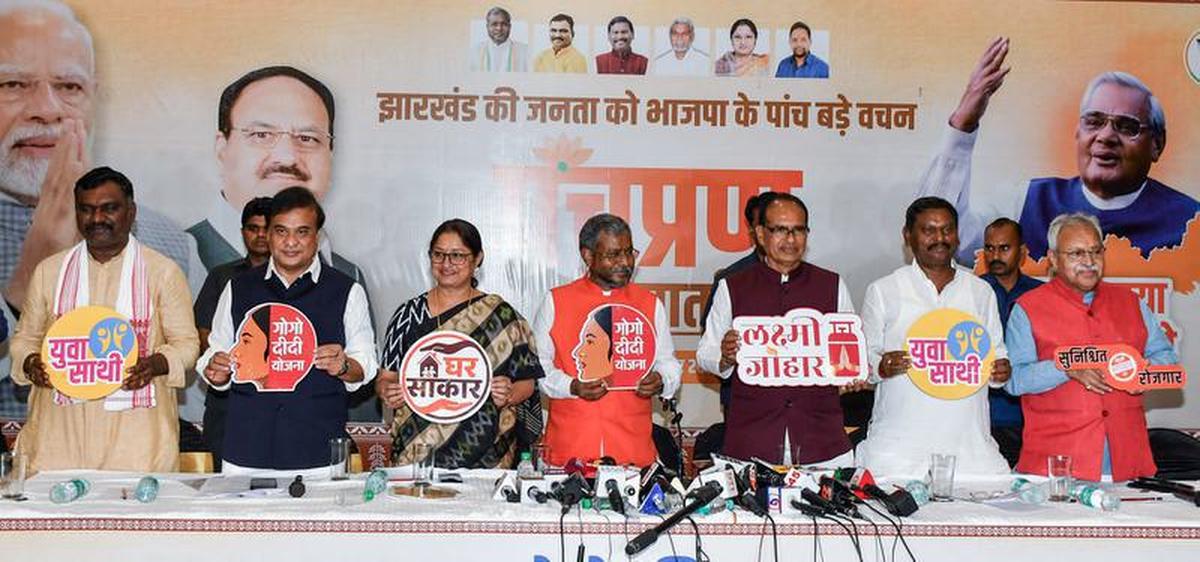Sukhiya Tirkey has never felt so important. After selling vegetables by the roadside in Ranchi for more than two decades, this is for the first time that the 48-year-old feels recognised as a constituency that can influence election outcomes.
As campaigning picks up with Jharkhand heading towards a two-phase Assembly poll next month, Sukhiya and several others like her have emerged as an influential voting bloc, prompting political parties to actively solicit their support this year.
On October 14, the Jharkhand Mukti Morcha (JMM)-led coalition government in the State approved an increase in the assistance given to women from families living below the poverty line under the Mukhyamantri Maiya Samman Yojana (MMSY) from ₹1,000 per month to ₹2,500.
The hike was triggered by the Opposition Bharatiya Janata Party’s (BJP) promise of giving a monthly allowance of ₹2,100 to women in the State if it comes to power. The party has already started distributing forms recording details of the likely beneficiaries.
While the raise in allowance is to come into effect from December, Jharkhand’s 81 Assembly constituencies will go to polls on November 13 and 20.
The vote bank
As per the electoral rolls, the State has a total of 2.59 crore voters — 1.31 crore male and 1.28 crore female — this year. Women outnumber men in 32 of the 81 constituencies.
Of these 32 seats, 26 constituencies are reserved for Scheduled Tribes (STs) and two for Scheduled Castes (SCs). Among these seats are Chaibasa, Ghatshila, Manoharpur, Kharsawan, Kunti, Shikaripara, Majhgaon, Maheshpur Littipara, and Simdega. The State has a total of 28 constituencies reserved for STs and nine for SCs.
More women exercised their franchise than men in Jharkhand during the Lok Sabha election held earlier this year, a good enough reason for political parties to woo this segment of the population. According to Jharkhand Chief Electoral Officer K. Ravi Kumar, the reason behind higher women turnout was active participation by them and the migration of men from the State.
Of the 1.7 crore electors who cast their votes in the 14 Lok Sabha seats, 87.11 lakh were women and 83.85 lakh were men, he told reporters after the election. “The number of women voters who exercised their franchise was higher in 12 Lok Sabha seats. The number of male electors who turned up at polling stations was slightly higher in two constituencies, Ranchi and Jamshedpur,” he said. “If we look at the figures Assembly segment-wise, women voters outnumbered men in 68 constituencies while the number of men who cast their votes was higher in only 13 Assembly seats,” Kumar said.
Realising the importance of women voters, soon after the Lok Sabha poll, the Hemant Soren-led government in August this year rolled out its flagship Mukhyamantri Maiya Samman Yojana (MMSY) for women aged 18 to 50. So far, 48.15 lakh women have registered and are receiving the benefits of the scheme. Women of 50 years and above are already getting ₹1,000 per month under the universal pension scheme in the State.
The Opposition BJP then announced its own version named Gogo Didi Yojana. Gogo is the Santhali word for mother and didi is sister in Hindi. In the competitive politics roiling the State in the build-up to the poll, the Soren government has now announced the hike to ₹2,500 per month — a decision that will entail an additional outgo of around ₹900 crore.
What women think
Unaware of the political tug of war, Sukhiya says, “I never imagined that we will get ₹1,000 per month from the government. There are four women in our family and we all are getting ₹1,000 each, which means an additional ₹4,000 per month. We have heard the government is planning to increase the amount.”
For 48-year-old Neelam Lakra, it is the cash assistance that she owes her independence to. Living in a slum in Ranchi’s Namkum, Neelam is happy that she is no longer dependent on anyone else for minor needs. “My husband is a daily wager and his earnings are not enough to run the family of five. This scheme has given us a lot of support to properly feed my three children. Getting ₹12,000 annually is a big relief for people like us,” she says.
As the political parties jostle to win over the women, beneficiaries like Neelam feel the competitive cash handout promises only help their cause. More competition also means more cash, she says.
Of late, the promise of financial assistance to women has become a norm in poll-bound States. In the wake of financial distress, cash handouts seem to have helped the BJP tide over anti-incumbency in several States. For instance, the Ladli Behna scheme in Madhya Pradesh, providing ₹1,000 per month to women whose household income is ₹2.5 lakh, is said to have enabled the party to retain power in the November 2023 Assembly election. After becoming the Chief Minister, Shivraj Singh Chouhan’s successor Mohan Yadav raised the monthly amount to ₹1,250 and promised to gradually increase it to ₹3,000.
Poll position: Jharkhand Chief Minister Hemant Soren at a programme for the beneficiaries of Mukhyamantri Maiya Samman Yojana.
| Photo Credit:
File Photo
Not a first
Hoping to replicate the success in Madhya Pradesh, the ruling Mahayuti alliance — the BJP, the Shiv Sena of Eknath Shinde, and the Nationalist Congress Party of Ajit Pawar — in Maharashtra came out with Mukhyamantri Majhi Ladki Bahin Yojana with an outlay of ₹46,000 crore to provide ₹1,500 a month to 2.5 crore women between the ages of 21 and 65 earning less than ₹2.5 lakh a year.
The BJP successfully tried something similar in the recently concluded Haryana Assembly election as well. The Congress had promised ₹2,000 to every woman aged between 18 and 60 if it came to power whereas the BJP had promised ₹2,100 per month to women under Lado Lakshmi Yojana.
Despite going all out to woo the women vote in Maharashtra, the BJP has been targeting Soren in Jharkhand over the cash assistance scheme and calling it a political stunt before the election. The party’s Jharkhand president, Babulal Marandi, had earlier accused the Chief Minister of luring voters by rolling out several schemes in the run-up to the election.
“Hemant Soren cheated the people of Jharkhand for five years. Bholi bhali janata ko dana daal rahe hai takey phas jaye (He is laying the bait to trap the innocent public now that the election is nearing),” Marandi said at an event recently.
Soren already transferred the third instalment of the scheme earlier this month. In a recent statement, the Chief Minister said, “We have connected half of the State’s population with the Samman Yojana, which has created history in this country. Fifty lakh women have been connected with this. We are empowering the mothers and sisters of the State.”
The first instalment was given on the eve of Rakshabandhan in August, second in September, and the third was rolled out in October. The fourth instalment would be transferred on the eve of Chhath Puja on November 5.
Mounting an attack on Soren, Assam Chief Minister Himanta Biswa Sarma, who is also the BJP co-incharge of the Jharkhand Assembly election, accused him of tricking the women of Jharkhand by not giving ₹2,500 from the beginning and revising the amount only after the BJP’s offer. Before the imposition of the Model Code of Conduct on October 15, around 60,000 women filled the forms for Gogo Didi Yojana, he said.
“We are committed towards our promise of Gogo Didi Yojana and whenever the first Cabinet of the BJP-led NDA is formed, this scheme will start. Unlike Hemant Soren, we will not wait for five years. If he had the resources for giving ₹2,500, why did he start the scheme with ₹1,000?” Sarma said.
Trying to blunt the Opposition’s attacks, the JMM has fielded its Gandey MLA and Chief Minister’s wife Kalpana Murmu Soren, who has been leading the JMM outreach, ‘Maiya Samman Yatra’, in a bid to connect with the State’s women population.
Kalpana entered politics earlier this year after her husband was jailed in an alleged money laundering case in March. He was later released on regular bail. She went on to contest and win the Gandey bypoll, a seat vacated after Sarfaraz Ahmad’s election to the Rajya Sabha, by a margin of 26,000 votes.
Despite entering the political arena only a few months ago, the Gandey MLA is the ‘star campaigner’ that every JMM leader wants to campaign in their favour. So far, she has done over 50 public meetings.
Last month, she was seen sitting on the bonnet of a car wearing a sari, thanking the women in Jamshedpur for showing their support to the cash transfer scheme and other programmes launched by the government in recent times.
“Kalpana Soren is able to connect with the women voters directly. Many in rural areas see her as someone like them despite being a Chief Minister’s wife. Someone who sits with them, eats with them, and talks to them,” says Manju Kisku, 35, a resident of Lohardaga district.

BJP leaders at a press meet in Ranchi on October 5.
| Photo Credit:
File Photo
BJP stronghold
Jharkhand has always been a stronghold of the BJP as the party ruled the State for 13 years since its formation in 2000. However, it has been struggling to recapture the tribal votes in recent years. In the 2019 Assembly election, of the 28 reserved seats, it only won 2, down from 11 in 2014.
Overall, the JMM-Congress-Rashtriya Janata Dal alliance won 47 seats whereas the BJP bagged only 25 — 12 seats down from 2014. In the Lok Sabha election earlier this year, the Opposition party lost all five ST reserved seats. It failed to reap any benefits even after naming Marandi, a Santhali tribal, the State party chief.
Ticket to women candidates
While the party has mounted a strong campaign to regain lost ground, the BJP announced names of 14 women in its first list of 66 candidates on October 19. The ruling alliance has named nine women candidates so far.
However, many tribal women taking part in the BJP rallies seem oblivious to the political concerns. What matters to them is their new-found independence.
“During elections, political parties make thousands of promises but they hardly fulfil them when they come to power. At least Hemant Soren has given us what he promised. We hope he will give the increased amount after coming back to power. We will be able to purchase new clothes and crackers for my children to celebrate Diwali with the money received in the three instalments. We have not spent that money yet,” says Ramesh Kumar, a resident of Bishnugarh in Hazaribagh who runs a cycle repair shop. His wife Sabita nods in agreement.
Annu Mahato, a resident of Dhavaiya village in Nawadih block of Bokaro district, says, “I have received all three instalments of MMSY. The BJP has also announced something but that amount will come only when they come to power. Doesn’t matter who is giving, what matters is how much.”
Published – October 25, 2024 02:03 am IST






